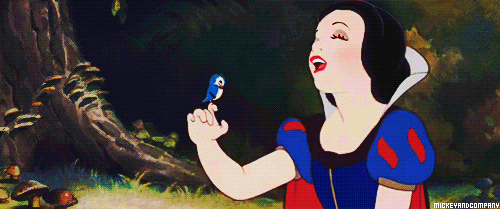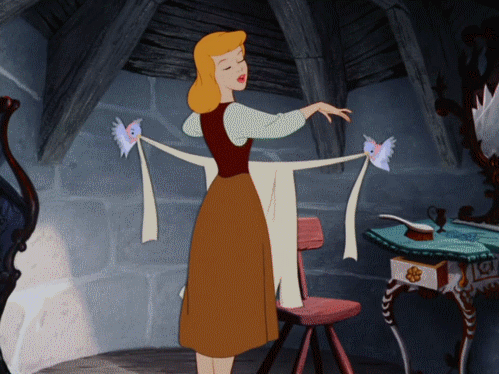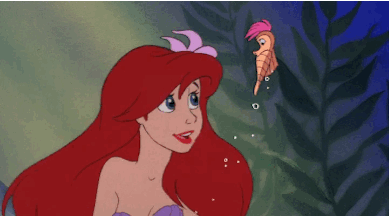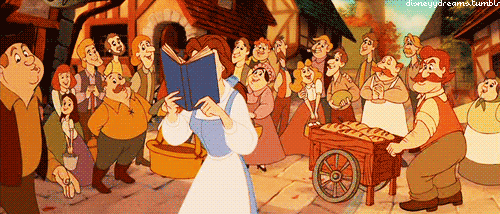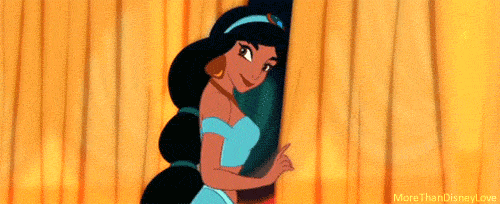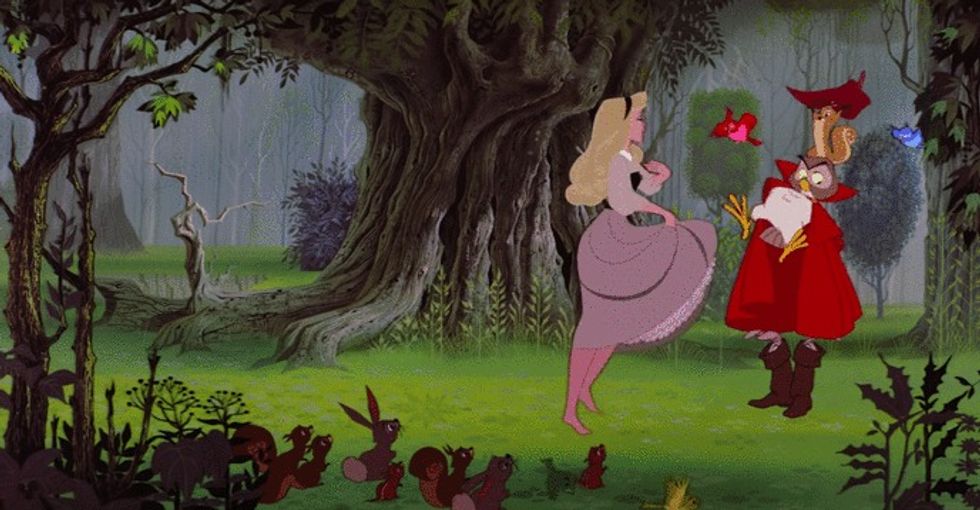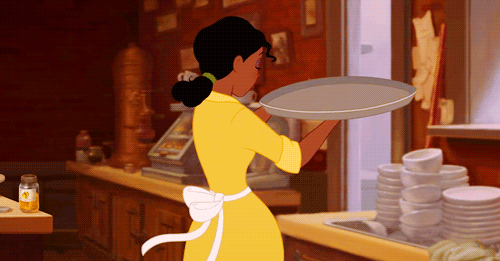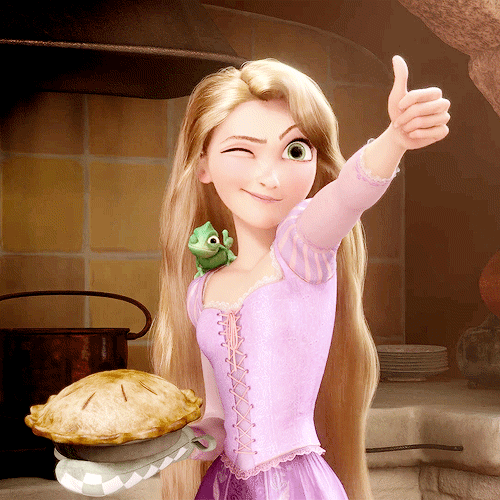You know what really grinds my gears? People who blast Disney for being "anti-feminist," because if any of them had actually watched a Disney movie they would know that Disney is nowhere near anti-feminist. I don't mean newer Disney films, such as Frozen or Brave aren't anti-feminist. I mean every single Disney princess film isn't anti-feminist. Take a gander below to find out why.
1. Snow White
Snow White is quite possibly the most optimistic person you'll ever meet. Her positivity and kindness shouldn't be mistaken for weakness though. Let us not forget, she was almost killed. And instead of waiting for someone to help her out, she makes her own way. She finds the cottage, and she immediately takes control of it. Many argue that she ends up falling into a subservient role with the dwarves, but I beg to differ. She runs the household: the dwarves do what she asks them to, not vice versa.
2. Cinderella
Her father dies, and she's left with a wicked stepmother and stepsisters. What does she do? Make the most of her situation. She never once gives into the negativity she would be completely justified to have. Her trip to the ball was not a trip in search of a man to save her- it was simply a trip in search of fun and freedom for one night. Remember the sequels to this movie? They were all about being true to yourself and doing things your own way rather than how society tells you to.
3. The Little Mermaid ![]()
One thing that has constantly baffled me is how people claim that Disney princesses are always saved by a man. When Ariel first sees Eric, she saves him. If not for her being there when the storm hit, Eric would have died. Remember later in the movie when they find out Ursula is who's really marrying Eric? Ariel and her friends are the ones to stop the wedding, yet again saving Eric. Another weak argument presented about this movie is how it promotes "changing yourself for a man"... uh, hello, when Ariel sings "Part of Your World" she sings only about wanting to explore the human world and learn everything about it. She never once mentions Eric, because guess what, she hadn't even met him yet! She wanted to be a part of the human world long before him. Why else do you think the movie opens with her exploring a sunken ship for remnants of human culture? Why else does she have a grotto filled with human treasures and trinkets?
4. Beauty and the Beast
Ah yes, Belle. The princess people claim was only good for her looks. Yes, it was her beauty that saved the beast. It wasn't her patience and understanding. It wasn't her pushing the beast to be a better, kinder person. No, the thing that saved the beast was Belle's sexuality and looks. *Scoffs* This heroine is a bookworm who doesn't fit in because she's a woman who reads and thinks and has no concern for marriage. If her sexuality and appearance were the sole weight of her character, she would've been married to Gaston and that would've been the end of it. However, she sees Gaston for the monster he is and society as ignorant. Her falling in love with the beast isn't what saves the beast either. Remember, the curse put on him was in order to make him learn to love someone other than himself. Her reciprocation of this love is only half of the spell breaker.
5. Pocahontas
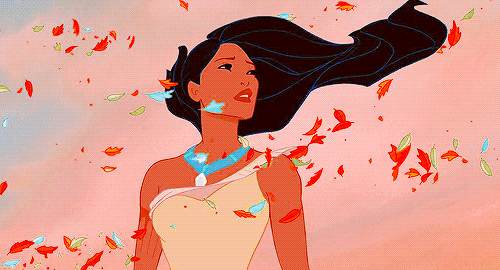
6. Aladdin ![]()
Jasmine is yet another princess against the idea of an arranged marriage. She doesn't want to be and do what society expects, she wants to be her own person free to make her own choices. So, she runs away to escape her constricting life. Yes, Aladdin has to save her in the marketplace. But you know what? Woman cannot do all herself. Neither can man. What's wrong with getting help? Receiving help from someone doesn't make you weak or "antifeminist", it makes you human. One person cannot do it all on their own. At the end of the movie, Jasmine is set on marrying Aladdin despite his not being royal. She would rather follow her heart and not be a princess, than conform.
7. Sleeping Beauty
Okay, so Aurora doesn't get a lot of screen time. And yeah, she has to be saved by a prince. BUT, let us not forget her curse was placed upon her by a woman. And the only reason the prince is able to save her is because the three fairies, also female, gift the prince with weapons and help him the whole way to the castle where Aurora sleeps.
8. The Princess and the Frog
Remember how everyone thought Merida was the first real feminist Disney princess? Maybe the other princesses weren't overtly strong women, but let's get real- Tiana was the real first overtly strong female years before Merida was given this title. Tiana is hardworking. She doesn't expect to be given anything, she expects to have to earn everything. When Naveen falls in love with her, his plan isn't to whisk her away to his royal castle to live as his princess. His plan is to work hard to help her get her restaurant. He fully intends to work with Tiana and help her with her own business. Never once is he dismissive of her plans and dreams. Rather than place his desires over hers, he decides to work hard to help her achieve her goals. In the end, they get her restaurant with her hard earned money. All Naveen does is support her. They are a team.
9. Tangled
Rapunzel is pretty heavily mentally and emotionally abused by Mother Gothel. And yet, Rapunzel is such a strong character. She endures her situation and makes the most of it. When she sees an opportunity to see the lights, she takes it. She runs the show, not Flynn. When they're chased by the royal guard, Rapunzel whisks Flynn to safety. When they're about to drown, she saves them with her hair. When Flynn comes to her rescue at the end, he chops off her hair to save her. He would rather die than live knowing that she's still a prisoner. And he does die for a few minutes, until Rapunzel saves him with her magical tears. What's that? She saves him?
Yes, that's right. Pretty much every princess saves her prince at some point, and if she doesn't, the prince is helped by other women in the movie. Even in cases where the princess has to be the one saved, that princess is still strong and feminist. People seem to have this skewed idea that a woman shouldn't ever need to be saved. Somehow, we've come to believe that a feminist woman only comes in one mold: The Merida mold. The princess who never marries and never shows interest in a man at any point. But what's wrong with marriage and love? Why does having a love interest automatically make a princess "antifeminist"? When did we develop this idea that feminism means free of man in any way? Feminism at its core is about equality. And shouldn't equality mean being able to have a love interest and still be a strong character? Plenty of male characters fall in love and marry, and are still able to kick ass. Their marriage doesn't make them weak. Why then do we treat princesses' happily ever afters as weak?
Disney has its problems, sure. However, being antifeminist isn't one of them. If Disney were truly antifeminist, none of these princesses would've done half the things they did. They all would've just been maidens sitting around waiting to be married off; kind of like the women in Jane Austen novels, which no one takes issue with despite the fact that every one of her novels has to do with marriage. The sole plot of every Austen novel is a woman who struggles to find love but then ends up happily married. Whereas in Disney movies, marriage is something that happens but isn't the main focus. Yet, every woman holds Austen heroines to be feminist and strong. What a paradox- a woman obsessed with marriage can still be seen as a strong character, but a princess who happens to get married can't.
Bottomline, marriage and love don't make a woman any less of a feminist. Receiving help or being saved also does not make a woman any less of a feminist. Even manly men like Superman receive help and are saved. If we aren't labeling Superman as weak, we shouldn't be labeling Disney princesses as weak. Because that's true feminism: treating the sexes equally.


